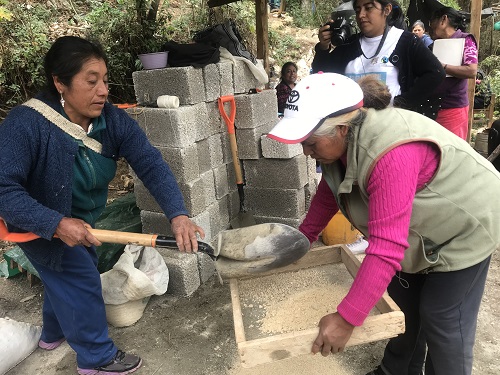
Desription of project: The Ikoots, Mixe, Mixteca and Zapoteca indigenous communities of Oaxaca State suffer from marginalization. Since 2011, EECO has been working with women in 28 communities to improve their climate resilience, strengthening their participation in local and State policy processes and their leadership on adaptation and mitigation actions. Community centers for refugees and committees involving 3,330 indigenous women have developed self-built eco-technologies for energy, water and sanitation based on ancestral know-how. They provide input in territorial public policies designed by communities, with a gender responsive, intercultural and rights-based approach. This project, already replicated in other states, contributes to tackling climate challenges with an exemplary governance scheme of co-responsibility between government and civil society.
Climate Impact: Women participate in public policy design in Oaxaca, defining specific actions for the State Law and State Climate Change Program initiative. With 1850 self constructed eco-techniques, i.e. fog condensers, water canals and tanks, they rehabilitate ancestral know-how, capture 54 M liters of rainwater per semester, efficiently responding to droughts and frosts that threaten cultures and saving 85% of the crops. 667 dry toilets, 143 biodigesters and 511 efficient stoves have saved 5,903 tons of CO2 and reduced deforestation.
Gender Impact: EECO uses a gender-based approach with risk and vulnerabilities evaluation. They help transforming marginalized indigenous women in grassroots leaders within the spaces of decision-making and local development. The technologies have been adapted to women’s needs and resolve most problems of health, excessive workloads and economic constraints. More than 3,000 women have been trained directly, creating 3 committees for community management and 9 for risk management; today 357 women have endorsed a leading role in their community.
Scalibility: This holistic project started in 8 communities, rapidly expanding to 28, indirectly benefiting 2000 villages in Oaxaca State. Training women leaders gives the knowledge a greater outreach at municipal and state levels. A monitoring and evaluation process ensures steady improvements, leading to references in international forums and attracting the academic world. Pedagogical materials and games have been translated into several languages and creative communication campaigns on social media and radio allow for wide, international knowledge dissemination.